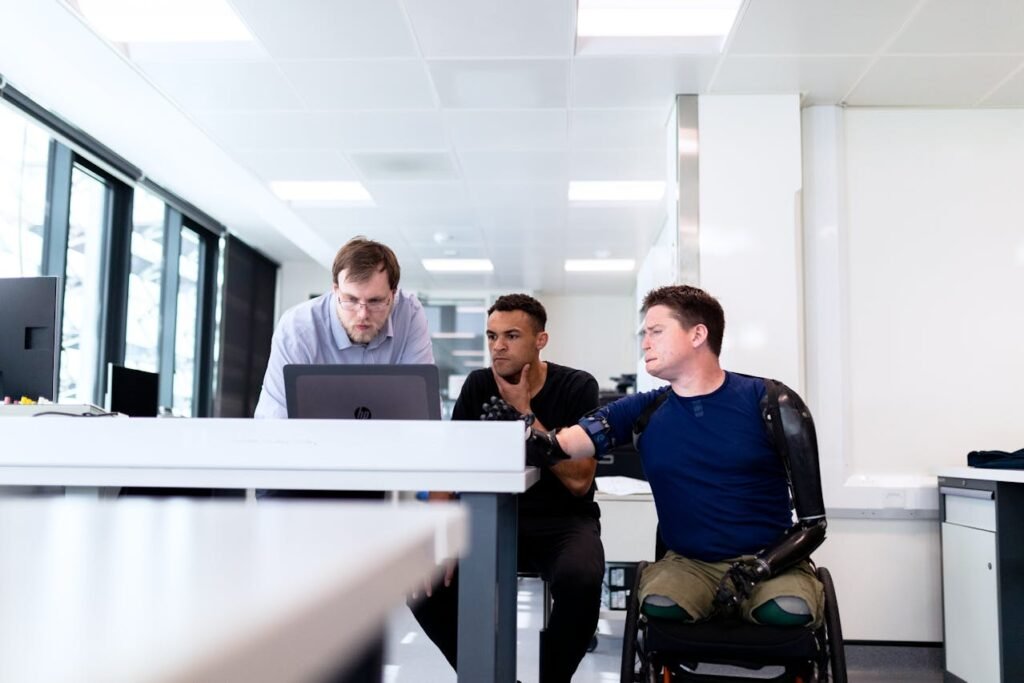For children with limb loss, a prosthetic device can open the door to independence, confidence, and countless possibilities. However, the needs of a child are vastly different from those of an adult. Pediatric prosthetics must not only provide functionality but also adapt to a child’s rapid growth, active lifestyle, and emotional well-being.
Advancements in technology and design are transforming the landscape of pediatric prosthetics, offering solutions that are lighter, more adaptable, and tailored to each child’s unique needs. As a parent, understanding these latest trends can help you make informed decisions about your child’s prosthetic care. This article explores these innovations, addressing how they benefit young users and the actionable steps you can take to navigate this life-changing journey.
The Unique Needs of Pediatric Prosthetics
Children require prosthetics that are significantly different from those designed for adults. Their bodies are still growing, their activities are more dynamic, and their emotional needs often include a strong desire for self-expression. Addressing these factors is essential for creating prosthetics that support their development and foster a positive outlook on life.
Growth and Adaptability
One of the most significant challenges in pediatric prosthetics is accommodating a child’s rapid growth. Unlike adult users, children outgrow their prosthetics quickly, requiring regular adjustments or replacements to ensure a proper fit.
Modern pediatric prosthetics are designed with growth in mind, offering modular components and adjustable features that extend the device’s usability.
For example, some prosthetic systems now include interchangeable parts that can be easily replaced as the child grows. This approach reduces the overall cost and inconvenience of frequent replacements, making prosthetic care more sustainable for families.
Supporting Active Lifestyles
Children are naturally active, whether it’s climbing trees, riding bicycles, or playing sports. Their prosthetics need to be lightweight, durable, and capable of withstanding the wear and tear of everyday adventures.
Recent advancements in materials, such as carbon fiber and reinforced polymers, have made it possible to create prosthetics that balance strength with flexibility. These materials ensure that the device can handle rigorous activity while remaining comfortable for the child to wear.

Emotional Considerations
Prosthetics play a significant role in a child’s self-esteem and social interactions. A well-designed prosthetic can help a child feel confident and capable, reducing feelings of isolation or self-consciousness.
Customization options, such as vibrant colors or personalized designs, allow children to express their personalities through their prosthetics, turning them into a source of pride rather than discomfort.
Businesses focusing on pediatric prosthetics must prioritize not only functionality but also the emotional and social aspects of their designs. Engaging children in the customization process can empower them and create a stronger connection to their prosthetic.
Latest Innovations in Pediatric Prosthetics
Technological advancements are driving a wave of innovation in pediatric prosthetics, addressing the unique challenges faced by young users while unlocking new possibilities for mobility and independence.
3D Printing for Customization
3D printing is revolutionizing the way pediatric prosthetics are designed and manufactured. By using digital scans of a child’s anatomy, 3D printing allows for the creation of highly customized prosthetic devices that fit perfectly and adapt to the child’s needs.
This technology also enables faster production times, meaning children can receive their prosthetics more quickly. Additionally, 3D printing opens the door to greater personalization, allowing families to choose colors, patterns, and shapes that reflect the child’s personality.
For businesses, investing in 3D printing capabilities can enhance efficiency and reduce production costs while offering a unique value proposition to parents.

Lightweight Materials
Children’s prosthetics must be lightweight to ensure comfort and ease of use. Advances in material science have introduced options such as titanium alloys and composite polymers, which combine strength with minimal weight.
These materials are particularly beneficial for upper-limb prosthetics, where reducing weight minimizes strain on the shoulder and improves usability. Businesses that prioritize lightweight designs not only enhance the user experience but also gain a competitive edge in the pediatric market.
Smart Prosthetics
AI-powered prosthetics are making their way into pediatric care, offering features like adaptive grip strength, real-time feedback, and customizable movement settings. These smart systems use sensors to analyze the child’s movements and adjust the prosthetic’s functionality accordingly.
For instance, a smart hand prosthetic can learn to differentiate between gripping a toy and holding a pencil, ensuring appropriate force and precision for each task. This adaptability enhances the child’s ability to engage in a wide range of activities confidently.
Supporting Parents in the Prosthetic Journey
Navigating the world of pediatric prosthetics can be overwhelming for parents. From selecting the right device to ensuring proper care and maintenance, the process involves many considerations. Businesses and clinicians play a critical role in guiding parents through this journey, offering solutions that address both practical and emotional needs.
Personalized Consultations
Each child’s prosthetic needs are unique, shaped by their age, level of limb loss, lifestyle, and personal preferences. Personalized consultations help parents understand the options available and choose a device that aligns with their child’s requirements.
Clinicians and businesses should focus on clear, empathetic communication, explaining the features and benefits of different prosthetics in simple terms. Demonstrating how a device works or allowing the child to try a demo prosthetic can also help parents and children feel more confident in their decision.
For businesses, providing ongoing support after the initial fitting is equally important. Regular check-ins to assess the prosthetic’s fit, functionality, and the child’s comfort ensure that adjustments are made proactively as the child grows or their needs change.
Gamified Rehabilitation Programs
Adapting to a prosthetic can be a challenge, particularly for children who may feel frustrated or anxious about learning to use their new device. Gamified rehabilitation programs are a creative and effective solution, turning therapy into an engaging and enjoyable experience.
These programs use game-like activities to help children develop coordination, strength, and confidence with their prosthetic. For example, a virtual reality (VR) system might involve interactive tasks where the child uses their prosthetic hand to catch falling objects or complete a puzzle.
For businesses, partnering with developers to create gamified training tools can enhance user satisfaction and set their products apart in the market. Providing families with access to these resources as part of a prosthetic package demonstrates a commitment to holistic care.
Empowering Parents with Knowledge
Education is a powerful tool for empowering parents and ensuring they feel confident in managing their child’s prosthetic care. Businesses and clinicians can play an active role in providing accessible, actionable information at every stage of the process.
Understanding Prosthetic Features
Parents often have questions about the technical aspects of a prosthetic, such as how it works, what materials it’s made from, and how it should be maintained. Clear, jargon-free explanations help parents make informed choices and feel more comfortable with the device.
Businesses can create user-friendly guides, videos, or workshops to explain these features. Interactive platforms where parents can explore options and compare features at their own pace further enhance their decision-making process.
Fostering a Support Network
Parenting a child with a prosthetic can sometimes feel isolating, but connecting with other families who have similar experiences provides invaluable support. Businesses and clinics can foster these connections by organizing community events, support groups, or online forums.
For example, a business might host a family day where children can participate in activities while parents attend sessions on prosthetic care and hear from other families.
Creating a sense of community not only supports parents but also builds brand loyalty by positioning the business as a trusted partner in their journey.
Simplifying the Complex World of Prosthetics
Pediatric prosthetics can feel overwhelming, especially for parents new to the process. From choosing the right device to understanding how it works, the sheer volume of information can be daunting.
Businesses can bridge this gap by breaking down complex topics into simple, digestible formats that address common concerns.
For example, creating a step-by-step guide that explains the journey from the initial consultation to the final fitting can demystify the process. Including visuals, such as diagrams or videos, helps parents understand how their child’s prosthetic will be designed, manufactured, and adjusted over time.

Educating Parents About Maintenance and Care
A prosthetic device is only as effective as the care it receives. Parents need to know how to maintain their child’s prosthetic to ensure its longevity and performance. Businesses can empower parents by offering clear, practical guidance on care and maintenance routines.
For instance, a series of video tutorials could cover topics such as cleaning the device, checking for signs of wear and tear, and performing simple adjustments at home. Providing a maintenance checklist that parents can follow regularly makes the task more manageable and helps prevent costly repairs or replacements.
Additionally, offering periodic workshops or webinars on prosthetic care allows parents to ask questions, share experiences, and learn from professionals. These sessions not only build skills but also foster a sense of community among families.
Offering Personalized Consultations
No two children are the same, and their prosthetic needs will vary based on factors such as age, activity level, and personal preferences. Personalized consultations are a valuable way for businesses to educate parents while addressing their unique concerns.
During these consultations, specialists can explain the specific features of different prosthetics, highlighting how they align with the child’s needs and lifestyle. Demonstrating how a device works or allowing parents to interact with sample prosthetics provides hands-on understanding and reassurance.
For businesses, offering free or low-cost initial consultations can encourage families to explore their options without financial pressure. This approach not only increases accessibility but also fosters trust and engagement with potential customers.
Helping Parents Understand the Emotional Journey
The decision to seek a prosthetic for their child often comes with emotional challenges for parents. Feelings of guilt, fear, or uncertainty are common, and businesses must approach these emotions with empathy and understanding.
Providing resources that address the emotional aspects of the journey can make a significant difference. For instance, creating a guide that explains how to talk to children about their prosthetic, or offering advice on building their confidence, empowers parents to provide emotional support.
Sharing stories of other families who have navigated similar experiences can also be uplifting. Businesses can host blogs, videos, or live discussions featuring parents and children who share their journeys, showcasing the transformative impact of pediatric prosthetics.
The Future of Pediatric Prosthetics
The field of pediatric prosthetics is evolving rapidly, with emerging technologies and innovative approaches that promise even greater benefits for young users. Businesses that stay ahead of these trends can play a pivotal role in shaping the future of care and enhancing the lives of children worldwide.
Neural Interfaces for Intuitive Control
Neural interface technology, which enables direct communication between the brain and a prosthetic, is one of the most promising advancements in prosthetics. While still in the early stages for pediatric use, these systems offer the potential for seamless, intuitive control.
For example, a child with a neural-integrated prosthetic arm could operate the device simply by thinking about the movement they want to make. This reduces the learning curve and creates a more natural experience, particularly for activities that require precision.
Businesses exploring neural interfaces for pediatric prosthetics should focus on developing systems that are safe, adaptable, and designed for growing bodies. Collaborations with neuroscientists and pediatric specialists can help ensure these devices meet the unique needs of children.

Sustainability in Pediatric Prosthetics
As the demand for prosthetics grows, sustainability will become an increasingly important consideration. Businesses can lead the way by adopting eco-friendly practices and materials that minimize waste and reduce environmental impact.
For instance, prosthetics made from biodegradable materials or components that can be easily recycled contribute to a circular economy while maintaining quality and durability.
Businesses that prioritize sustainability not only appeal to environmentally conscious families but also position themselves as forward-thinking leaders in the industry.
Business Strategies for Advancing Pediatric Prosthetics
The pediatric prosthetics market offers unique challenges and opportunities. Success in this field requires a deep understanding of the needs of children and their families, combined with innovative product development and strategic planning. Businesses that focus on user-centric solutions, affordability, and long-term support can position themselves as leaders in this vital area of healthcare technology.
Designing for Growth and Flexibility
Children grow quickly, and their prosthetics must adapt to keep pace. Businesses can prioritize modular designs that accommodate growth through adjustable or replaceable components. For example, a lower-limb prosthetic with extendable sections or interchangeable sockets ensures a better fit over time, reducing the frequency and cost of replacements.
To enhance this flexibility, businesses can also offer subscription-based services where families receive periodic updates or adjustments to their prosthetic devices as the child grows. This approach not only provides ongoing support but also fosters long-term relationships with customers.
Investing in digital modeling tools, such as 3D scanning and computer-aided design (CAD), further streamlines the process of creating growth-adaptable prosthetics. These technologies reduce lead times and improve accuracy, ensuring that each device meets the child’s needs precisely.
Expanding Access Through Cost-Effective Solutions
Affordability is a significant concern for many families seeking pediatric prosthetics. Businesses must explore cost-effective manufacturing methods to make advanced devices accessible to a broader audience without compromising quality.
One effective strategy is leveraging 3D printing, which allows for the production of customized components at a lower cost than traditional manufacturing methods. Another approach is developing partnerships with non-profits, healthcare providers, and government agencies to subsidize prosthetics for families in need.
Offering financing options or payment plans tailored to families can also make high-quality prosthetics more attainable. Transparent pricing and flexible payment structures demonstrate empathy for families’ financial concerns and build trust with customers.
Focusing on Personalization
Children’s prosthetics must go beyond functionality to provide a sense of identity and empowerment. Personalization is key to achieving this, as it allows children to feel a stronger connection to their device.
Businesses can incorporate customization options that cater to a child’s preferences, such as vibrant colors, themed designs, or even artistic elements created in collaboration with the child.
Providing digital tools that let families preview and select customization options enhances the overall experience and fosters excitement about the prosthetic.
For instance, an app that allows children to design their prosthetic by choosing patterns, materials, and accessories can turn the process into a creative and empowering activity. This not only improves satisfaction but also positions the business as a leader in child-focused innovation.

Building Comprehensive Support Networks
A prosthetic is only as effective as the support system behind it. Businesses can set themselves apart by offering comprehensive services that go beyond the initial fitting.
Creating a robust aftercare program ensures that families receive ongoing support, including regular check-ups, maintenance, and training. Offering 24/7 customer support or dedicated clinics for pediatric prosthetic users can address concerns promptly and maintain high levels of user satisfaction.
Additionally, businesses can foster connections between families by organizing community events or online forums. These platforms allow parents to share experiences, learn from each other, and feel supported throughout their journey.
For businesses, such initiatives create a loyal customer base and generate valuable feedback for product improvement.
Empowering Parents to Make Informed Decisions
Parents are central to the success of any pediatric prosthetic solution. By empowering them with knowledge and resources, businesses can help families make informed decisions that positively impact their child’s development and well-being.
Providing Transparent Information
Clear and transparent communication is essential. Parents need to understand the benefits, limitations, and maintenance requirements of a prosthetic device before committing to it. Providing detailed guides, videos, or interactive demonstrations can answer common questions and alleviate concerns.
For example, a series of short videos explaining how to care for a prosthetic, troubleshoot minor issues, or recognize when adjustments are needed can be incredibly helpful. Businesses that invest in such resources show a commitment to supporting families every step of the way.
Offering Trial Periods
Allowing families to trial a prosthetic before making a final decision can build confidence and trust. Trial periods give children the opportunity to adapt to the device and ensure it meets their needs, while parents can evaluate its practicality and ease of use.
For businesses, offering trials demonstrates confidence in the product and creates a positive customer experience. It also provides valuable insights into how the prosthetic performs in real-world conditions, which can inform future improvements.

Conclusion
Pediatric prosthetics are more than medical devices—they are tools of empowerment, enabling children to explore their world, build confidence, and embrace their unique potential.
Advances in technology, from 3D printing to AI-driven customization, are transforming what prosthetics can achieve, offering solutions that grow with children, adapt to their active lifestyles, and reflect their vibrant personalities.
For parents, understanding the latest trends in pediatric prosthetics is the first step in making informed decisions that will shape their child’s future. By focusing on functionality, personalization, and emotional support, today’s prosthetic solutions go beyond mobility to foster independence and joy.
For businesses, the pediatric prosthetics market represents a powerful opportunity to innovate and make a lasting impact. By prioritizing user-centric designs, building robust support networks, and investing in accessibility, companies can redefine prosthetic care for children and their families.



